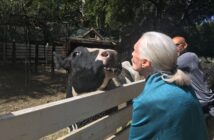Wilson died aged 92 the day after Dr. Thomas Lovejoy, on the same day as Archbishop Desmond Tutu. Ed is best known for his exhaustive study of ants, and his investigations, in different parts of the world, into the concept of evolution. As a result of these studies, he came up with the theory of Sociobiology. Initially he applied this to ant society, pointing out that the complex societies they formed were determined by genetic inheritance.
He then applied this theory to other animals and finally to humans – which created a good deal of controversy. Because some people never read his arguments carefully he was accused of being a racist and other unflattering terms. During one lecture violent protestors rushed up to the platform and seized the mic from him – and one woman tipped a bucket of ice water over his head. When the uprising was quelled, and Ed had mopped up most of the water with paper towels, he calmly went on with his speech! When I first met him this controversy was at its height. He knew that I was not happy to apply the concept of sociology to chimpanzee behaviour. I still vividly remember the time when he and I got together for dinner during that period. We discussed a great variety of fascinating subjects – and Ed was nothing if not fascinating – but we never once mentioned biodiversity!
Over the years Ed became more and more concerned with protecting the various plant and animal species in different habitats. He was one of the first proponents of the term ‘biodiversity’ (originally coined by Walter G. Rosen in 1986) which quickly became accepted throughout the scientific community and today it has become increasingly familiar to the general public. Just two years ago he and I shared a platform, at the big annual Esri conference, organized by Jack Dangermond, to discuss ways of tackling the terrifying loss of biodiversity around the world, and his belief that half the land surface of the globe should be protected for wildlife.
When asked how he would like to be remembered he says ”as the successor to Darwin.” Ed made a lasting contribution to science and will be sorely missed by his family and his many friends.






